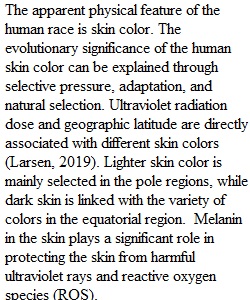


Q The most obvious characteristic that defines human "races" is the color of a person's skin. Discuss the evolutionary significance of skin color as we understand it today. Where are the extremes of dark and light skin pigmentation found, and what are the benefits of melanin AND risks of living in the "wrong" place? (i.e., what risks do very light-skinned people face in places with high UVB levels, and what risks do darkly pigmented people face in areas with low UVB levels?) Also, please remember, this essay is about the biology of skin color, NOT about race. Note: Please make sure to address all of the parts of this question - your answer will be a bit longer than some of the previous essay questions, but it is very important that you understand all of these aspects of skin color! HINT: remembering what you saw in the Nina Jablonski video that you watched will be very helpful for this assignment - just make sure you write your answer in your own words, not hers! Another HINT: If a question - ANY question - starts of with "Evolutionary significance of (whatever)," you MUST discuss your answer in terms of NATURAL SELECTION, selective pressures, and adaptation! If you do not do so, you will have missed the point and cannot receive passing credit for that essay! PreviousNext
View Related Questions